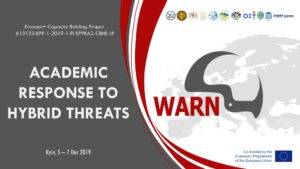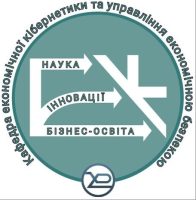1. JEAN MONNET PROJECT EUDISIM MODULE
Erasmus + project Jean Monnet module EUDISIM “European Union Digital Single Market: Policy, Integration and Harminization” 2019 – 2022.
Project №611988- EPP-1-2019-1-UA-EPPJMO-MODULE.
Coordinator of the project: Maksym Kolisnyk, PhD, Ass. Prof.
Project aim is to raise awareness of digital transformation, to share ideas and best practices of digitalisation, to promote digital and innovation cooperation of Ukraine with the EU.
Project objectives:
- To stimulate excellence in teaching and research in the field of European Integration of Ukraine ;
- To prepare the next generation, ready to make changes, through educating students by designing and delivering the new course on European Digital Single Market ;
- To involve students who are not automatically come into contact with European studies ;
- To valorise scientific results in the field of European Digital Single Market at regional, national and international levels;
- To disseminate tailor-made information about European integration to a wider public in Ukraine, with focus on regional and local levels.
Module thematic courses:
- European Digital Single Market (held by the Maksym KOLISNYK) – knowledge and skills on the analysis, evaluation and challenges of EU Digital Single Market
- EU law – Legal Approximation to EU Law, better regulation, data protection and copyright in the EU (held by Oksana TSUKAN and Vasyl ROSSIKHIN) – theoretical and practical knowledge in legislation of EU and Ukraine
- Artificial Intelligence (held by Oleksandr BEZSONOV) – understanding of core areas of AI and the connections among them, and with such other key AI areas as machine learning, robotics, natural language processing and multi-agent systems
Registration to the module:
https://forms.gle/jxXk4yVhuSBeJM8q6
“European Union Digital Single Market: Policy, Integration and Harminization” – Presentation


2. «Academic Response to Hybrid Threats – WARN (610133-EPP-1-2019-1-FI–EPPKA2-CBHE–JP)»

Erasmus+ -project national coordinator:
Associate professor of the Department of Economic Сybernetics and Management of Economic Security Department, Candidate of Economic Sciences, PhD, Associate professor.
The new hybrid threats challenge the world, and Ukraine in particular, on every level:- new threats result to unknown and dangerous vulnerabilities of the societies- currently societies lack sufficient knowledge and skills to cope with new threats- present academic curricula do not even remotely prepare to complex hybrid threats.- Ukrainian state officials, regional administrations and ministries dealing with reality of hybrid war, are lacking the knowledge and skills to recognize, classify and counter hybrid threats with required efficiency. The analysis of Ukrainian curricula in fields of business and administration, information and communication technologies, social and behavioral science, arts, education, journalism and information showed that current curricula tend to be discipline based and do not address hybrid challenges adequately. The project aims to renew the above listed curricula by introducing unique content that builds awareness of hybrid threats and innovative gamified teaching methods that provide skills and competences to tackle complex threats proactively. The upgraded contents, based on newest EU partner curricula, together with new gamified teaching methods based on AI-inspired adversarial learning, will be used both in MSc degree education and in LLL to train “positive change agents” in diverse professional fields. The change agents will learn to adapt proactively to new complex, hybrid challenges, and to disseminate their knowledge to the society. International community of educators and alumnae (WARN network) will be created to guarantee the sustainable development of the educational content, teaching methods and dissemination after the project. The project will link to diverse stakeholders (ministries, state officials, local authorities, companies) for developing the content and to create real life scenarios as teaching materials for both degree education and LLL intensive courses, and for training them to counter hybrid threats.
15 November 2019 – 14 November 2023
Specific and wider objectives:
Project WAN targets the national security and the skill gap in security services created by the emergence of hybrid threats. Security sector alone does not have the skills and resources for countering complex hybrid threats but has to rely on security awareness of the critical fields in the society. Understanding the complex interdependencies and resulting vulnerabilities in key sectors is essential for improving the resilience of the nation and hence, the security and welfare of its citizens.
- To fill the security skills gap across various professional domains to increase civic resilience to hybrid threats in Ukraine
- To adapt study programs in 7 fields of study and to create LLL course on Countering hybrid threats
- To pilot the adapted study programs and LLL courses
- To create a trans sectoral environment devoted to countering hybrid threats
Expected project outcomes:
I. To adapt 11 study programmes in 7 fields of study
II. To deliver the adapted study programmes and courses
III. To create a trans sectoral environment devoted to civic resilience to hybrid threats

3. PROJECT JEAN MONNET MODULE EUDI4C
Call: Erasmus Jean Monnet Module
Title: Ukraine-EU: Digital innovations making connections 4 changes
Project: #101047751
Acronym: EUDI4C
Period: 2021-2024 years
Coordinator:
Irina Kolupaieva
Professor, Doctor of Economic Sciences, Professor of the Economic Cybernetics and Economic Security Management Department
Members:
Tetiana Polozova
Head of Economic Cybernetics and Economic Security Management Department Professor, Doctor of Economic Sciences;
Iryna Sheiko
Associated Professor, PhD, Associated Professor of Economic Cybernetics and Economic Security Management Department;
David Cayla
Assistant Professor, Doctor of Economic Sciences, Vice Dean of the Faculty of Law, Economics and Management Angers University, France;
László Vértesy
PhD oec., Dr. habil, PhD jur., Dr. jur., Budapest University of Technology and Economics, Hungary.
The general objective of the course is to attract attention of the Ukrainian community to the necessity of digital innovations in all spheres of the society in order to foster integration and cooperation between Ukraine and European Union implementing best experience and strategies for changes.
Objectives:
- provide students with necessary knowledge and skills in the field of digital innovations development as a key factor for Ukrainian strategy of EU integration;
- encourage young generation, researches, professionals, teachers, and other academic representatives in European Union studies of digital innovations;
- encourage young generation to disseminate experience of EU studies of digital innovations and policy of their regulations;
- foster the dialogue between the academic world and society, identifying the gap of digitalization and determine strategy direction for Ukrainian society taking into account EU experience in the digital area;
- dissemination of the theoretical and practical knowledge about the role of digital innovations in EU and their importance for Ukraine;
- promote of scientific knowledge about development of digital innovations and their impact on EU integration;
- creation and strengthening cooperation under the Erasmus + programs between partner universities.
Module courses:
- Digital innovations that works 4 people;
- EU digital regulatory policy and EU cybersecurity strategy for Digital Age.

4. EU IC AI POLICY
Call: Erasmus Jean Monnet Modules.
Title: European approach in charge of ethical, legal and socio-economic artificial intelligence policy.
Project #101047552.
Acronym: EU ic AI policy.
Period: 2021-2024 years.
EU IC AI POLICY
Coordinator:
Oleksii Turuta, Ph.D., Associate Professor of the Department of Software Engineering
Members:
Irina Kolupaieva, Doctor of Economic Sciences, Professor of the Economic Cybernetics and Economic Security Management Department.
Olena Turuta, Ph.D., Associate Professor of Philosophy Department
Viktoriia Tsokota, Researcher, PhD in Psychological sciences.
The general objective of the project is to research and disseminate a European approach to excellence in AI: sharing an appropriate ethical and legal framework of studying for future developers and users, encouraging experience of technological developments implementation in the public and private sectors and preparing for socio-economic changes caused by artificial intelligence.






